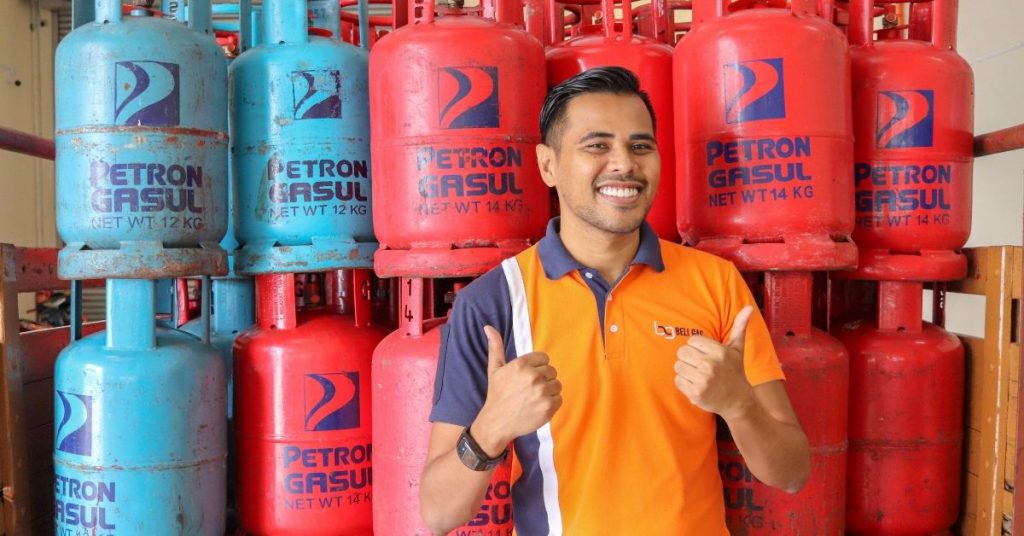[Written in partnership with BeliGas, but the editorial team had full control over the content.]
Suthan Mookaiah’s main reason for starting BeliGas 6 months ago was to provide immediate employment in a “pandemic-proof” business for B40 Malaysians who’d lost their jobs.
At the same time, he could see his LPG gas delivery business solving multiple problems directly related to the industry too.
The “crazy fluctuation” of prices and the substandard delivery quality were just two of them. “Gas prices can differ between RM28-RM35 between even 2 neighbouring houses for no reason,” he told Vulcan Post.
“Not only that, most houses also have a poor fire safety and awareness training on handling, usage and maintenance of gas equipment. This is where I saw the big opportunity to innovate with the digital and tech skill I have,” he added.
Getting It From The Source
Your standard LPG gas cylinder in a kedai runcit usually runs through multiple layers of middlemen, hence the high mark-ups, Suthan shared. It starts with the LPG supplier/manufacturer, goes to a premium stockist then a stockist, then to a dealer, to a sub dealer, to a runner, and finally, to your kedai runcit where you’d make the purchase.
By working directly with LPG gas suppliers, BeliGas is able to offer low prices. Their standardised prices for a 14kg cylinder delivery across 123 service areas within the Klang Valley are:
- Pre-order 1 day before: RM25.60
- Same-day order, standard delivery between 9AM-6PM: RM26.60
- Same-day order, but urgent delivery in 1 hour: RM29.60
- Same-day order, but delivery after 8PM: RM38.60
If your delivery requires them to walk up stairs or use the lifts in apartments or condos, there will be an RM3 surcharge.
From what we can see, BeliGas’ offering is cheaper than that of its closest competitor, HaloGas too.
A 14kg cylinder from HaloGas will run you RM26.50, but that’s without the delivery fee calculated based on your area. On the other hand, pre-ordering with BeliGas costs RM25.60, with no extra delivery fees.
Suthan also added that they use tech and logistics efficiency to optimise the cost of deliveries, where savings are then passed to consumers.
Taking Matters Into Their Own Hands
“Initially, we used a third-party contractor in the first month, but logistics/delivery was terrible to say. It created a lot of chain problems in fulfilment and service delivery,” Suthan recalled.
To overcome that problem, he made the costly CaPex decision of using his personal savings to build BeliGas’ own delivery fleet, hiring drivers and purchasing transport vehicles.

Not only did this solve their delivery problems, but it now reduces their Opex cost on a day-to-day basis too.
Dictionary Time: CapEX means capital expenditure, which is the cost of developing or providing non-consumable parts for the product or system, while Opex means operational expenditure, which is the ongoing cost of running a business.
For a company that started its deliveries on July 1, 2020, Suthan was proud to share that they’d hit RM1,000,000 in cumulative revenue this week (at the time of writing). Today, they deliver about 6,000 cylinders a month.
In all, Suthan is also proud that he’s accomplished his main goal of hiring B40 and other unemployed Malaysians too. So far, 40 Malaysians are on BeliGas’ payroll, and they’ve even hired ex-convicts to work in their hub and HQ warehouse.
“We built the business during the worst times.”
“When everyone was scaling down on marketing, we decided to scale up using a lot of offline media, which drove the cost up in 6 figures. We believed in brand building, even in trying times,” Suthan said.
They also used digital media such as vlogs and group promos that endeared them to local communities online, and proving that they walked the talk after earned them fans.
Haters in a business are nothing new, but the majority of negative feedback they get is mainly from locals who live outside of their delivery areas, Suthan mused.
What was more alarming to the team was how they got threats and blackmails consistently from other players in the business when they headed to new areas.

“All we do is make sure our riders are well informed on how to handle the situation professionally, get insurance, and focus on being customer-centric. And then we report when needed,” he said.
BeliGas is set to launch in Georgetown, Penang as well as Tampoi, Johor, but the lockdowns have put a bit of a delay in their plans. Suthan is also eyeing an expansion to the East coast, and he’s confident they can move quickly into the regional market within 1-2 years.
To add value to their services, BeliGas’ white-labelled SIRIM approved gas regulators will be coming out soon, along with the sale of fire safety kits. They’re also looking to release a micro-insurance product.
With regards to Suthan’s mission of providing more jobs for the B40, he intends to create micro-entrepreneur programmes through partnerships with GLCs or NGOs.
Featured Image Credit: Suthan Mookaiah, Managing Director of BeliGas













